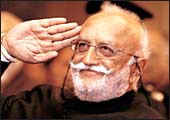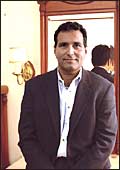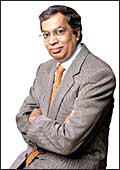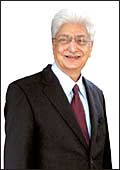|
The
three companies that are clubbed together as the Indian it industry's
Tier I, TCS, Infosys and Wipro- strangely enough, there's a certain
phonetic cadence to their names when strung together, irrespective
of the order in which the companies are taken-are around the same
size in terms of revenues (give or take a few hundred million
dollars here and there), number of employees (again, give or take
a few thousand here and there), and nature of business (overlooking
obvious differences related to the type of contracts they prefer,
or their revenues from specific industry-segments). Why, even
the men who head these companies are of similar vintage: TCS CEO
S. Ramadorai, turned 60 in October 2004; Wipro Chairman Azim Premji
reached the milestone in July 2005; and Infosys Chairman N.R.
Narayana Murthy will do so in August this year.
The similarities, though, while interesting
enough to find mention here, are not why this magazine believes
the three men feature here. If Messrs Premji, Murthy and Ramadorai
were the business leaders of 2005-it seems unnecessary to mention
here that this is an opinion and that readers are free to buy
into it, trash it, or even write to us with alternative names
if they have the energy to do so-it is because each did something
in the course of the year that set a trend or highlighted one,
reflected the changing face of India Inc. or served as a stark
pointer to the fact that plus CA change, plus c'est la meme chose
(the more things change...), or simply proved why they are as
different as they are from their peers.
| Ramadorai, Premji & Narayana Murthy
are all trendsetters |
Murthy, first. In 2005, he took on a politician,
former Prime Minister and Janata Dal (s) leader H.D. Deve Gowda,
just as in 2004, he had taken on another, then hrd Minister Murli
Manohar Joshi. He tried to do his bit to revive Bangalore's crumbling
infrastructure (he failed), resigned from the stewardship of Bangalore
International Airport Limited (BIAL) when Gowda alleged that he
had done nothing for the company, and articulated (as he had a
few years ago), his half-desire to be India's ambassador to the
United States. And, in a year when some people in Bangalore started
calling him the new Mahatma-this was in the wake of the spat with
Gowda and the term was used part derisively, part respectfully-Murthy
confirmed that he would step down as Executive Chairman of Infosys
Technologies come August 2006 (when he turns 60). Renunciation
has never come easily to India's CEOs. Earlier last year, Tata
Sons revised an earlier norm about its non-Executive Directors
relinquishing their position when they turned 70, and introduced
a new one that put the ceiling at 75. That will allow Ratan Tata
to continue as Chairman until December 2012.
Ramadorai, next. The last year began badly
for TCS (its January-March 2005 financial results didn't look
good), but the company recovered quickly. More importantly, in
September, the company struck a blow for all of the Indian it
industry when it bagged a $260-million (Rs 1,170-crore) deal from
Dutch bank ABN Amro for application development and maintenance
(ADM, the thing that accounts for the bulk of the revenues of
almost all Indian it services firms). Infosys Technologies, too,
grabbed a $140- million (Rs 630-crore) piece of the overall deal
valued at $1.8 billion (Rs 8,100 crore). In the normal scheme
of things, a customer with $1.8 billion worth of business up for
outsourcing (the amount includes hardware and infrastructure too)
would have picked a large vendor such as IBM, who would have then
shopped out smaller pieces to other vendors, some of whom would
have been Indian firms. This deal, then, signifies many things:
the creation of space at the high-table for Indian firms; the
ability of these firms to play with the big boys such as IBM and
Accenture; and a growing belief among customers that there is
wisdom in breaking a large deal into several mid-sized ones.
Premji, last. In a year when his personal
holding in Wipro decreased by some 2 percentage points to around
82 per cent, the man bid adieu to his most high-profile lieutenant,
Vice Chairman Vivek Paul. Claiming he had always been "hands-on",
Premji set about re-shaping Wipro and the buzz is, this year could
see the company make a really big acquisition. In many ways, though,
the promoter-manager, professional-manager clash in one the country's
most competitive companies (and in one that is engaged in the
relatively new-age business of Information Technology) is indicative
of India Inc.'s heritage. Most companies continue to be owned
or controlled by promoter-families.
 The
Adventurer The
Adventurer
The thing about people such as Vijaypat
Singhania, Chairman Emeritus, Raymond Group, Hon. Air Commodore,
Indian Air Force, aviator, writer, film-maker, is that there is
always something else waiting to be done, another record waiting
to be broken. "It has been my obsession," says the man
simply, of his record-breaking ascent to 69,852 feet in a hot-air
balloon (in late 2005). 70k next.
-Ahona Ghosh
Alive, He Cried
 For
a few months in 2005, everyone was talking about Sahara Supremo
Subrata Roy's illness, even his alleged death. Then, the
man made it to the front page of a daily, proclaiming his health
and performing feats of strength and endurance. His public appearances
since have been infrequent, but calculated. For
a few months in 2005, everyone was talking about Sahara Supremo
Subrata Roy's illness, even his alleged death. Then, the
man made it to the front page of a daily, proclaiming his health
and performing feats of strength and endurance. His public appearances
since have been infrequent, but calculated.
-Krishna Gopalan
 Gotcha Gotcha
Former volkswagen exec Helmut Schuster
had the perfect caper: set up a company in India, convince
a state government to invest money in return for a plant in that
state and siphon off the funds. Andhra Pradesh, to its embarrassment,
took the bait.
-KG
 VC-turned-VC VC-turned-VC
That's vice chairman turned venture capitalist,
and after six years with Wipro, helping the company achieve an
image that was finally in keeping with its business, GE-alum Vivek
Paul left the company, ostensibly because he wanted to try
his hand at being a venture capitalist. Now a partner at Texas
Pacific Group, Paul says he is "truly excited about what
lies ahead".
-AG
Take A Bow
Last year, Warburg Pincus sold its remaining
stake in Bharti Tele-Ventures, 5.65 per cent, to Vodafone. On
an investment of $300 million or Rs 1,350 crore (the investor
had, at one time, an 18 per cent stake in the telco), Warburg
made around $1.6 billion (Rs 7,200 crore). Head Rajesh Khanna
should take a bow.
-Krishna Gopalan
 The
Saheb Returns The
Saheb Returns
After 50 years, Hindustan Lever Limited,
India's largest consumer products firm, got an expatriate, Douglas
Baillie, as CEO. Now in charge of the company's operations
in Turkey, Baillie will take over in March. Although the company
hasn't said so, the change may have been necessitated by HLL's
recent performance.
-Ahona Ghosh
Equal Opp. Employer?
 Even
if he is not guilty of casteist remarks, as alleged by a Scheduled
Caste employee B.M. Ramteke, IDBI Chairman V.P. Shetty
deserves a mention here for being perhaps the first Indian corporate
head to realise that whiffs of casteism can, much like those of
sexual harassment, be used to settle intra-corporate scores. Even
if he is not guilty of casteist remarks, as alleged by a Scheduled
Caste employee B.M. Ramteke, IDBI Chairman V.P. Shetty
deserves a mention here for being perhaps the first Indian corporate
head to realise that whiffs of casteism can, much like those of
sexual harassment, be used to settle intra-corporate scores.
-AG
 Dealmaker's
Deal Dealmaker's
Deal
One of India's best-known dealmakers, Hemendra
Kothari struck the deal of a lifetime when he agreed to sell
his 47.73 per cent stake in DSP Merrill Lynch for $500 million
(Rs 2,250 crore) to Merrill Lynch. "When I started business,
my objective was to be a leading financial house," says Kothari
who has done just that.
-KG
The Real Thing
 Is
he guilty? Was he framed? The jury is out on that one, but fact
is, Salil Chaturvedi, the promoter of Provogue, a fashion brand,
was arrested under the Narcotic Drugs and Psychotropic Substances
(Prevention) Act in August after a former employee seemingly ratted
on him. He spent 34 days in custody. Is
he guilty? Was he framed? The jury is out on that one, but fact
is, Salil Chaturvedi, the promoter of Provogue, a fashion brand,
was arrested under the Narcotic Drugs and Psychotropic Substances
(Prevention) Act in August after a former employee seemingly ratted
on him. He spent 34 days in custody.
-AG
 Vroom! Vroom!
The buzz is, soon after he sold his 64 per
cent stake in BPL Communications to Essar, Rajeev Chandrasekhar
went out and splurged on a Lamborghini (he is fond of fast cars
and big bikes). Now, the former Intel employee, who nets around
Rs 1,000 crore from the deal, is looking for new investment opportunities.
-KG
 The
Deal That Wasn't The
Deal That Wasn't
First, Purnendu Chatterjee announced that
he was part of a consortium taking over Basell for $5.7 billion
(Rs 25,650 crore). That was contingent on Chatterjee buying out
the West Bengal government from joint venture Haldia Petrochemicals,
a deal that went awry. So did the Basell deal.
-KG
|







 The
Adventurer
The
Adventurer For
a few months in 2005, everyone was talking about Sahara Supremo
Subrata Roy's illness, even his alleged death. Then, the
man made it to the front page of a daily, proclaiming his health
and performing feats of strength and endurance. His public appearances
since have been infrequent, but calculated.
For
a few months in 2005, everyone was talking about Sahara Supremo
Subrata Roy's illness, even his alleged death. Then, the
man made it to the front page of a daily, proclaiming his health
and performing feats of strength and endurance. His public appearances
since have been infrequent, but calculated. Gotcha
Gotcha VC-turned-VC
VC-turned-VC The
Saheb Returns
The
Saheb Returns
 Dealmaker's
Deal
Dealmaker's
Deal Is
he guilty? Was he framed? The jury is out on that one, but fact
is, Salil Chaturvedi, the promoter of Provogue, a fashion brand,
was arrested under the Narcotic Drugs and Psychotropic Substances
(Prevention) Act in August after a former employee seemingly ratted
on him. He spent 34 days in custody.
Is
he guilty? Was he framed? The jury is out on that one, but fact
is, Salil Chaturvedi, the promoter of Provogue, a fashion brand,
was arrested under the Narcotic Drugs and Psychotropic Substances
(Prevention) Act in August after a former employee seemingly ratted
on him. He spent 34 days in custody. Vroom!
Vroom!
 The
Deal That Wasn't
The
Deal That Wasn't